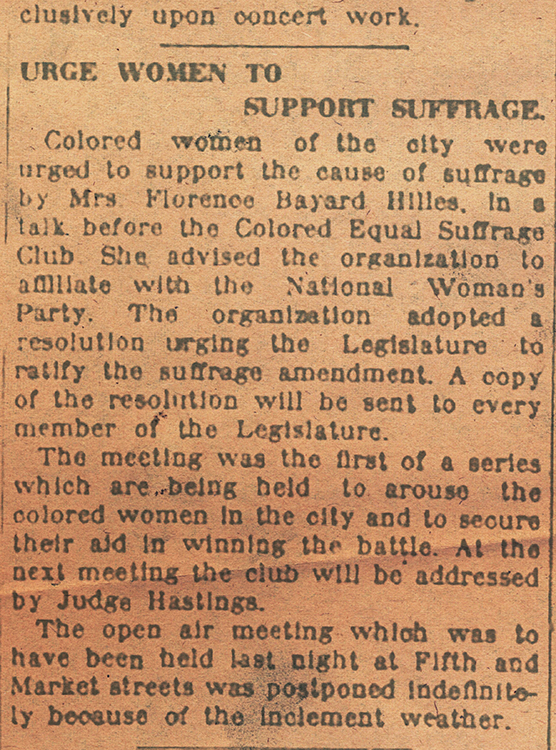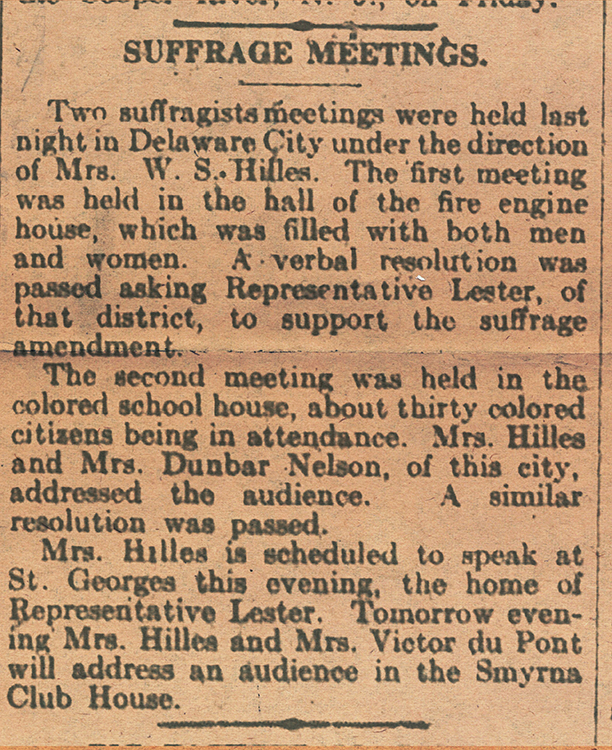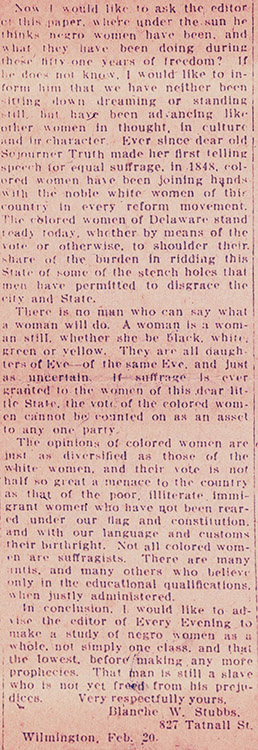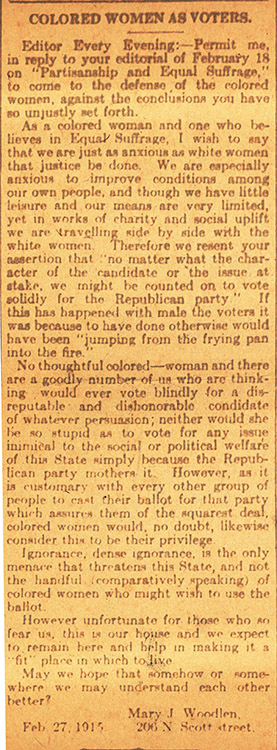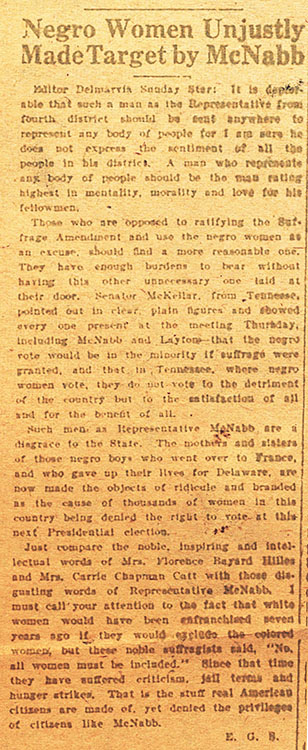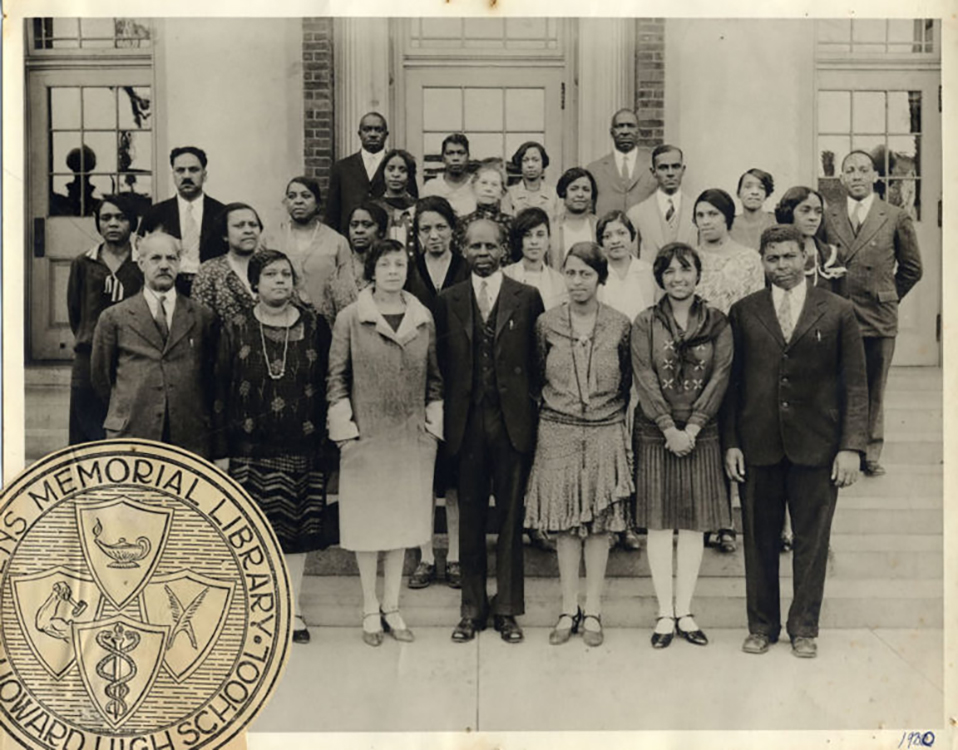Delaware’s African American suffragists participated actively in the campaign for voting rights. In 1915, Wilmington teacher, poet, and writer Alice Dunbar-Nelson (1875-1935) spent several months touring Pennsylvania as a suffrage organizer. Her task was to drum up support among African Americans for a November referendum on women’s voting rights. With New Jersey holding a referendum (in October), Dunbar-Nelson also spoke there. Her scrapbook recorded her appearances. Newspaper clippings covered speeches in which she frequently tied black women’s access to the ballot to their needs as working women. By underlining the lived experiences of African American women, she offered a critique of gauzy suffrage images of women “in the home.”
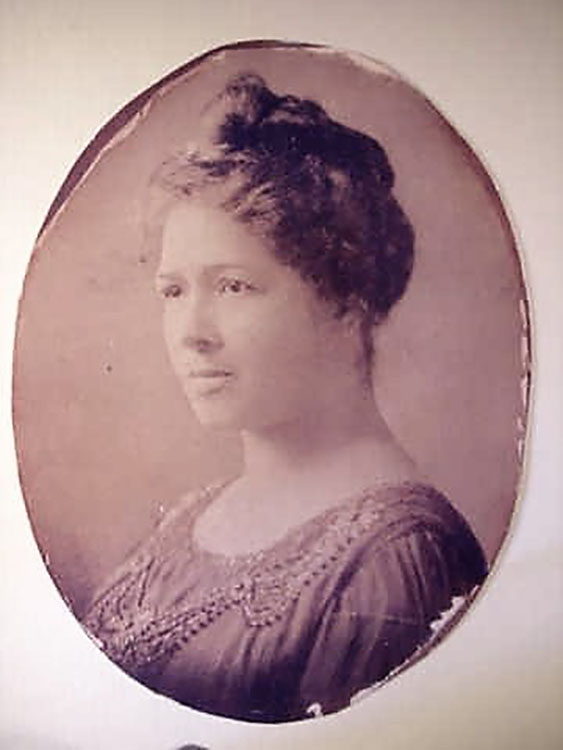
In 1915, as the Delaware General Assembly considered amending the state constitution to enfranchise women, two members of the African American Equal Suffrage Study Club challenged the racially inflammatory anti-suffrage views of the editor of the Wilmington Every Evening, Merris Taylor. Each was forthright in her denunciation of Taylor’s assumptions about African American women. Mary J. Woodlen (1870-1933) accused him of “ignorance, dense ignorance” about black women; Blanche W. Stubbs (1872-1952) tartly suggested that he was “a slave” to his prejudices.
Delaware’s white suffragists, fearful of poking the hornet’s nest of white fears about African American voting, kept their distance from their African American counterparts. But during the 1920 ratification struggle, Florence Bayard Hilles made joint appearances with Alice Dunbar-Nelson at black women’s clubs and churches, urging members to join the National Woman’s Party.
During the 1920 special session of the General Assembly, anti-suffrage Wilmington representative John E. “Bull” McNabb freely flung racist slurs around the legislative chamber, at one point proposing to disenfranchise Delaware’s African American men. Emma Gibson Sykes (1885-1970), in a letter to Wilmington’s Sunday newspaper, singled out McNabb as a “disgrace to the state” while praising Hilles for her support. Anti-suffragist Mary Wilson Thompson, for her part, strewed red rose petals in McNabb’s path and praised him as the antis’ champion.
Despite the attempted arrest of national suffrage leader Mary Church Terrell (1863-1954) in Dover, the 1920 election “passed … nicely and peaceably” as suffragist Alice G. Baldwin (1859-1943) noted, with Wilmington’s African American women voting without incident. A coalition of white and African American women voters defeated McNabb in his bid for a Delaware Senate seat. In former Confederate states, however, African American women encountered massive resistance to their efforts to exercise their voting rights. In 1921, Alice Dunbar-Nelson, Blanche W. Stubbs, Mary J. Woodlen and three colleagues joined a 60-woman delegation protesting the National Woman’s Party’s unwillingness to take any action on the disfranchisement of African American women. Alice Paul turned their protest aside, arguing that the issue was one of “race” not “sex.”

CONFRONTING RACIST ARGUMENTS - In 1915 letters to Wilmington’s two evening newspapers, African American suffragists Blanche W. Stubbs and Mary J. Woodlen called out a racist editorial that had appeared in Every Evening, opposing an amendment to the state constitution that would enfranchise all Delaware women. Each directly addressed the editorial’s demeaning stereotypes of African American women; each challenged its author’s assumption that, as voters, black women would mindlessly vote Republican. Still, a headline-writer chose to misrepresent the full content of the letter from Blanche Stubbs.
- Blanche W. (Blanche Williams) Stubbs (1872-1952). “Many Anti-Suffragists … ,” Letter to the editor, (Wilmington) Evening Journal, February 23, 1915.
- Photograph portrait of Blanche W. Stubbs, circa 1910. Facsimile image courtesy of H. Gordon Fleming.
- Mary J. (Mary J. Johnson) Woodlen (1870-1933). “Colored Women as Voters,” Letter to the editor, (Wilmington) Every Evening, March 1, 1915.
CROSSING RACIAL LINES - As the Delaware General Assembly was debating whether to ratify the 19th Amendment, Alice Dunbar-Nelson and Florence Bayard Hilles made several joint appearances at African American women’s community and club meetings, urging them to pass resolutions of support for ratification. Simultaneously, Emma Gibson Sykes, at whose Wilmington home the Equal Suffrage Study Club had held its first meeting in 1914, published a letter in the Sunday Morning Star condemning State Representative John E. McNabb’s use of racist slurs in the debate and praising Hilles for her “noble, inspiring … words.”
- “Urge Women to Support Suffrage” (Wilmington) Evening Journal, April 13, 1920.
- “Suffrage Meetings,” (Wilmington) Every Evening, April 14, 1920
- Emma Belle Gibson Sykes (1885-1970). Letter to the editor signed E.G.S., (Wilmington) Sunday Morning Star, April 4, 1920.
A photograph of the Howard High School staff, taken around 1930, included three of the founding members of the Equal Suffrage Study Club:
- Helen Wormley Anderson Webb (1877-1962), front row, fifth from right
- Nellie B. Nicholson Taylor (1888-1965), second row, fifth from right
- Caroline B. Williams (1875-1971), second row, sixth from right
Photograph of Howard High School staff, circa 1930. Facsimile image courtesy of Howard High School Alumni Association.

